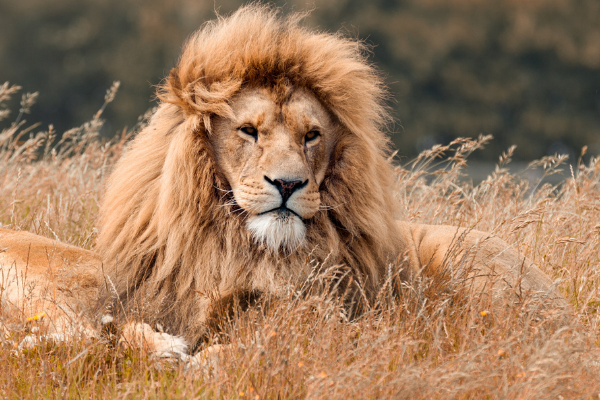Another lion has been murdered in Zimbabwe, one of the worst wildlife managers on earth, by a perverse U.S. trophy hunter.
The alleged killer is Phillip Smith of Columbia, Missouri, owner of Peak Sport Spine (peaksportspine.com/about-us/).You can e-mail Smith and tell him what a disgrace he is at info@pssrehab.com.
Twelve-year-old Mopane lived in Hwange National Park, the same park Cecil the lion was slaughtered in six years ago. Reports indicate that just like Cecil, who was lured with an elephant carcass as bait, Mopane was possibly lured out of the park. Like Cecil, Mopane did not die immediately. Instead, he apparently spent the next 24 hours wounded, after which time he was finally killed. It is not known if his misery was ended by another arrow or by a bullet.
With his impressive mane, Mopane was well-known to local tour guides and international tourists visiting the area to catch a glimpse of him.
It is shameful that U.S. Fish and Wildlife Service issues permits to import the parts of lions and elephants from Zimbabwe when it’s so-called conservation program fails to meet high standards for transparency, scientific management and effectiveness. The same goes for plenty of other African countries.
That’s why Friends of Animals filed a rulemaking petition with the agency in June to stop the importation of all sport-hunted “trophies” of threatened and endangered animals. FWS hasn’t responded yet. If the agency denies the petition, then FoA can challenge it in court.
“If the goal of the Endangered Species Act is conservation of species, our regulations should not grant a loophole legalizing the slaughter of the most vulnerable among them and then add insult to injury by permitting the glorification of the killing through the importation of their dismembered body parts,” said Steve Hernick, an attorney for Friends of Animals Wildlife Law Program. “Permitting individuals to hang lion and leopard heads or mount elephant tusks on the walls of their homes, for example, undermines the message that we should be protecting them.”
Banning the import of trophies into the United States will have a profound impact on threatened and endangered species since Americans kill far more animals than any other nation.
FoA’s petition points out that FWS blindly equates money spent on a trophy hunt with enhancement of the propagation of a species, ignoring evidence to the contrary—studies show that trophy-hunting programs are grievously damaging species such as elephants and lions. The petition shows that trophy hunting encourages poaching by reducing the stigma of killing these animals and providing poachers with a way to camouflage their parts. It also reveals trophy hunting has disturbing sociological effects on hunted populations and interferes with natural selection by removing a species’ strongest and healthiest animals from the gene pool, leaving threatened and endangered animals more vulnerable to extinction.
“Trophy hunting sends powerful shockwaves through the core of a species’ society that can lead to profoundly alarming and unnatural behavior,” Hernick said. “Furthermore, it kills the members of a species most able to adapt to environmental changes. Considering the current extreme flux in their environment due to climate change and habitat loss, we are effectively condemning trophy-hunted species to extinction.”
Mopane was known to have formed a coalition with another male lion named Sidhule, and the two males formed a pride with two adult females and six sub-adults of about 16 to 18 months old. Locals were concerned that Sidhule and Mopane would be targeted by trophy hunters and started a petition to protect them. Unfortunately, Sidhule was killed two years ago this month by a trophy hunter.
Because Mopane was a father and played a significant role in his pride, his pride is now vulnerable to takeover by another male or group of males, which may lead to the killing of the cubs and females in his pride.
For all these negative effects, there is no evidence that trophy hunting aids in conservation. Studies show that only about 3% of trophy hunting revenues go to support conservation in local communities. The economic benefits to conservation are far stronger from non-consumptive community-based wildlife watching tourism—it is the silver bullet for protecting African wildlife, not actual bullets.
“Killing is not conservation,” said Priscilla Feral, president of FoA. “Banning the importation of the body parts of species who are ecosystem engineers, climate change combaters and apex predators crucial to ecosystems and helping to increase their populations is conservation.”

